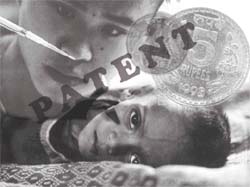Patents Vs Patients
Patents Vs Patients

The global pharmaceutical industry is feeling the heat. Following the industry's embarrassing withdrawal in April from a case against the South African government over the issue of access to cheap aids drugs, the us government dropped its complaint against Brazil's law dealing with the same issue at the World Trade Organisation (wto) on June 25, dealing a fresh blow to the leading global pharmaceutical companies' business in the developing world. The us climbdown could encourage other developing countries to adopt a liberal interpretation of the wto's rules on intellectual property, known as trips (Trade Related Intellectual Property Rights), making it easier for them to override drug patents.
The wto, which is for the first time confronted with a moral issue of the pricing of lifesaving drugs for poorer nations, convened a special meeting of the trips council in Geneva on June 20, under pressure from a group of African countries. The meeting was significant as it revealed that the developed nations were willing to let the developing countries use the flexibility in the trips agreement. Top on the agenda was the question as to why developing countries were unable to use the flexibility of the trips agreement to get cheap drugs from sources other than the companies that hold the patents. Though the meeting was a prelude to the annual ministerial meeting to be held in Doha, Qatar, in November, the meeting was important as it revealed the extent to which the issue of access to medicines was becoming a major flashpoint in context of the wto. In Doha, an extra day has been set aside for discussing the issue.
While the trips agreement does not directly affect the accessibility to drugs and is quite flexible, countries are unable to use these because of the pressure from developed countries that try to protect their drug industry. Some analysts like I S Gilada of Unison Medicare and Research Centre, an hiv Care Centre in Mumbai, say that developed countries use diplomatic influence and political blackmail to stop developing countries from using this flexibility. Signatories of the trips agreement are bound to buy the antiretroviral drugs needed by aids patients from patent holders. Since they are priced very high, they are out of reach of a majority of patients.
Drug companies are not interested in volume, but in higher revenues from the sales and therefore, sell their drugs at a high price,' says Biswajit Dhar, fellow at the Research and Information System for the Non-Aligned and other Developing Countries, New Delhi. The only option governments is to either take a license from the patent holder and produce the drugs or import them from countries where generic copies of the drugs are being produced. While nothing in the trips agreement stops the members from doing either, pharmaceutical companies are averse to this.
The problems faced by South Africa and Brazil have made it very evident that clarifications about the provisions in the trips agreement are needed so that the developing countries can use them without fear and also incorporate some provisions in their laws.
At the trips meeting, participants felt that developing countries needed more flexibility in the agreement, which they felt could be attained through a better collaboration between the wto, World Health Organisation (who) and the World Intellectual Property Organisation (wipo). Developing countries felt the trips agreement should not restrict governments to provide medical treatment. The European Union members agreed, but emphasised that since intellectual property rights are important in advancing creativity and innovation, patents should be protected. They felt that the provisions in the trips agreement are sufficient to protect the health policies of the developing countries and emphasised the importance of developing infrastructure to utilise the available resources in an efficient way.
Jayashree Watal, intellectual property expert at the wto, says that flexibility in the trips give options to the countries, but it depends on whether and how governments use them. Whether this decision would harm them or not would depend on the level of development of the country, she says. Yusuf K Hamied, managing director of Cipla Ltd, which raked up a controversy recently by offering to sell aids drugs at one-third the price of patent holders, says that every country must frame laws which would enable them to use the flexibilities of the trips agreement. "The trips agreement is only a guideline, around which each country has to develop laws dealing with intellectual property,' he told Down To Earth. He says that no two countries can have the same rules and rules have to be formulated according to the needs of the country. In the Indian context, he feels that the modifications suggested for the Indian Patents Act, 1970







